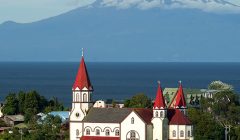Both towns are considered the “most German” towns in Chile. Despite the fact that there have been far fewer German-speaking immigrants in numbers than in Brazil or Argentina, their cultural influence in Chile has been much greater.
Kassler with sauerkraut and mashed potatoes or asparagus with boiled ham can be found on the menus of these towns’ restaurants decorated often in southern German style. All across Chile, “kuchen” (cake) has become a classic food served during the afternoon coffee, which we will explore in detail in the next article.
Since Germans first immigrated to the country they brewed beer in the south central area of Chile according to the German Purity Law. We recommend all travelers visiting Chile to try a beer from the Kinsman brewery in Valdivia, the second most important settlement of German immigrants in Chile. Here in 1851 Anwandter founded the first German brewery in Chile. Kunstmann later carried on the city’s German brewery tradition under the German slogan “Das gute Bier” (The good beer) and has experienced great success since the 1990s.
Despite the presence of German schools and associations, which still shape the social life of Chileans with German roots, the German language itself has lost its importance due to mixed marriages, which increased dramatically during the second half of the 20th century and speak almost exclusively Spanish. However, this does not detract from German descendants’ awareness of their cultural heritage; they simply celebrate their German customs in Spanish.




